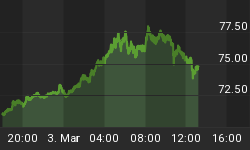"...The supply of cheap gold looks to be nearing its end. The supply of cheap money, on the other hand, only grows greater..."
ONCE UPON A TIME in the market place, says Economics 101, money had three primary functions.
A medium of exchange for buying and selling, money was also a unit of account for pricing those deals. Thirdly, it had to act as a store of value - a way of freezing wealth, ready to spend at some point in the future.
But monetary history post-WWII makes a mockery of this theory.
According to the official CPI index, the US Dollar has lost more than seven-eighths of its purchasing power over the last 60 years. One British Pound today will buy you what four pennies bought in 1947.
Perhaps it's no coincidence that the death of money as a store of value has come alongside the end of gold as money as well. Now replaced by Dollars, Euros, Sterling, Yen and Swiss Francs in the global marketplace, however, gold still retains its ability to freeze wealth for the future. For only gold remains in limited supply.
No one can abuse gold's rarity, creating it at will by clicking a mouse or promising a fresh loan. Mining production slipped 2% in 2006 according to new research from Virtual Metals. Its latest Yellow Book, sponsored by Fortis, agrees with the GFMS consultancy's data. It also forecasts that full-year mining output in 2007 will shrink further, sitting more than 5% below the level of 2002.
The supply of cheap money, in contrast, only grows stronger each day.
The broad supply of Euros (M3) is now growing at its fastest pace since spring 1983. Here in London, bankers are lending money to private equity firms at less than official interest rates, just so they can join the private-equity bubble.
Swiss Francs have managed to lose value against even the Dollar over the last two-and-a-half years. Now they continue to sink, depressed by low real rates of interest and the loss of gold-backing that they used to enjoy. Japanese interest rates remain so low, meantime, that the Tokyo government just sold a two-year bond with the highest coupon in well over 10 years - a whole one per cent per annum!
Then there's the Dollar...and nobody wants the Dollar, if only because there are so many of them piling up so fast everywhere.
China, for instance, now has such a pile of Dollars that it's joining the private-equity party too - giving $3 billion to Blackstone, the US investment outfit, in the hope of putting its export Dollars to work. But as Washington berates Beijing for not allowing the Chinese Yuan to float freely - and float higher - on the currency markets, pressure is mounting to cut US interest rates at home.
By extension, the cost of money worldwide looks set to drop further, too. Expect the value of money to sink - along with the price - as the supply continues to grow.
Gold, on the other hand, is becoming much harder to find. Formerly the world's No.1 producer, for instance, South Africa has seen its gold-mining output fall by more than one-half during the last decade. In the scramble to reverse this trend, work is about to start on the world's deepest-ever mining projects - more than 4 kilometers below ground.
But "mining deeper and deeper does not come cheaply," as Mining Weekly points out. On top of the global shortage in qualified geologists - and the English-speaking world's shortage of qualified engineers - "there is [now] a shortage of contracting capacity with shaft-sinking companies in South Africa," says Michael Solomon, CEO of junior platinum miner Wesizwe.
Already at Driefontein - currently the world's deepest gold-mine at 3,777 meters below ground - "mining at depth will cost ZAR66,000 per kilo [$296 per ounce] over the life of the mine." Given current spot gold prices above $670 per ounce, that level of operating expense would only make the new super-deep mines in Carletonville cost-effective for as long as the cost of digging that deep can be controlled. As it is, South Africa suffers higher gold-mining costs per ounce than even the United States. And now AngloGold Ashanti, Harmony Gold and Gold Fields all face a 15% wage demand from South Africa's National Union of Mineworkers, according to the Johannesburg press.
The shrinking supply of South African gold may be turned around in future, but it looks unlikely to ever recover. Real fixed investment in South Africa's mining industry grew by 7.1% last year; put that growth in context, however, and you'll find that it came after a 13.1% drop in 2005 and a cut of one-fifth in 2004.
The supply of cheap gold, in short, is nearing its end. The supply of cheap money, on the other hand, only grows greater each day.
So while you may not wish to price your next shopping trip in troy ounces, you might be well advised to save for your 2008 spending in physical gold bullion.
















